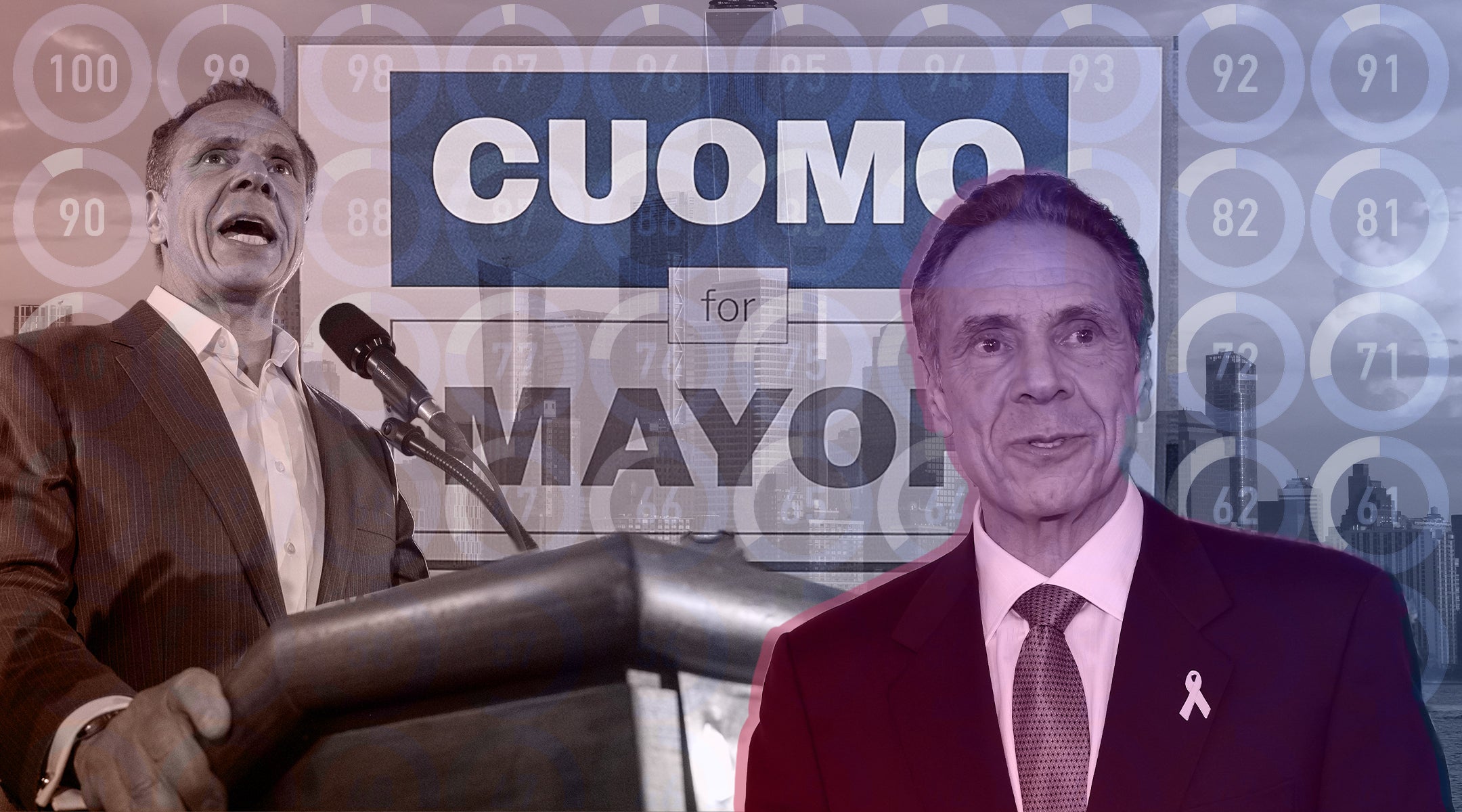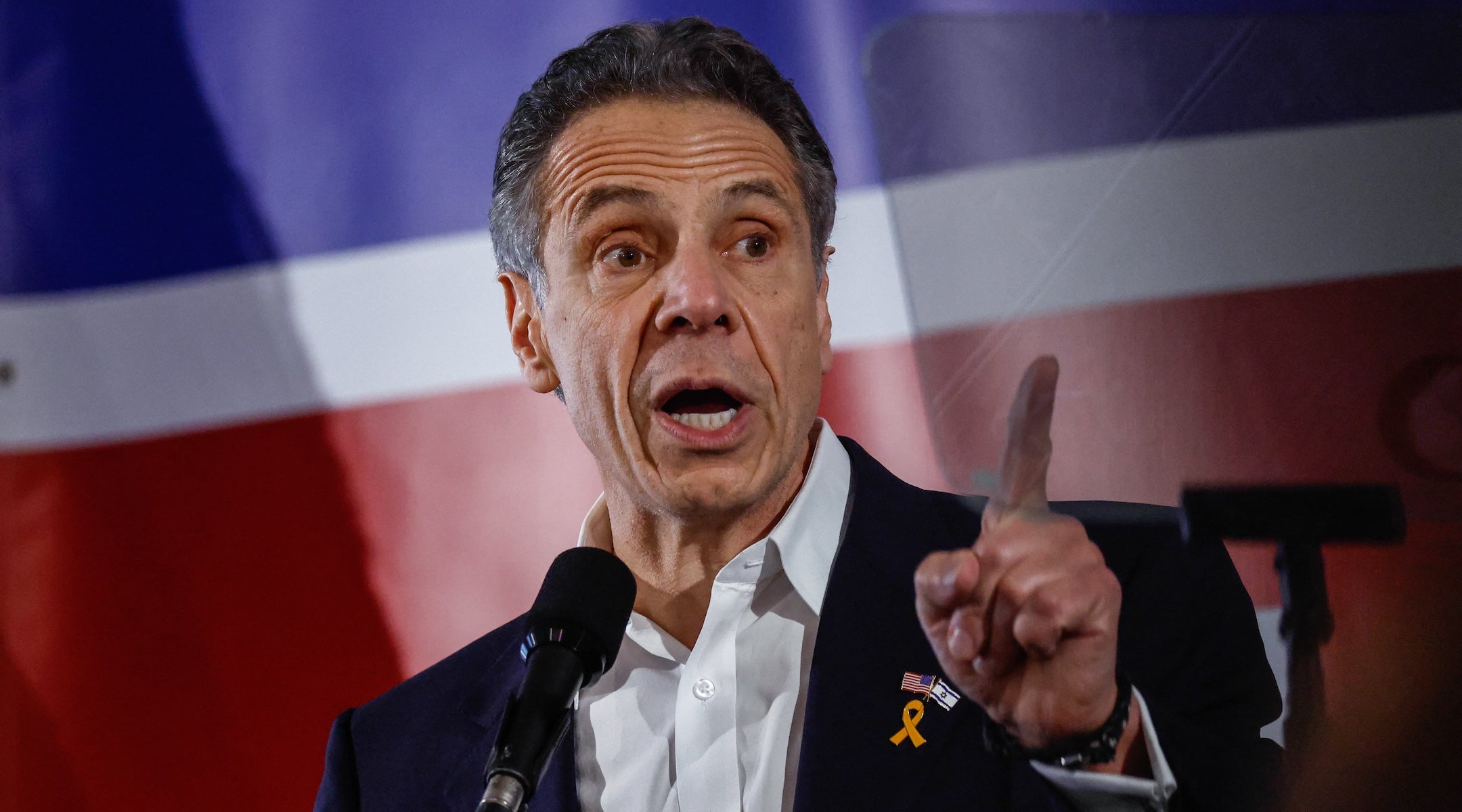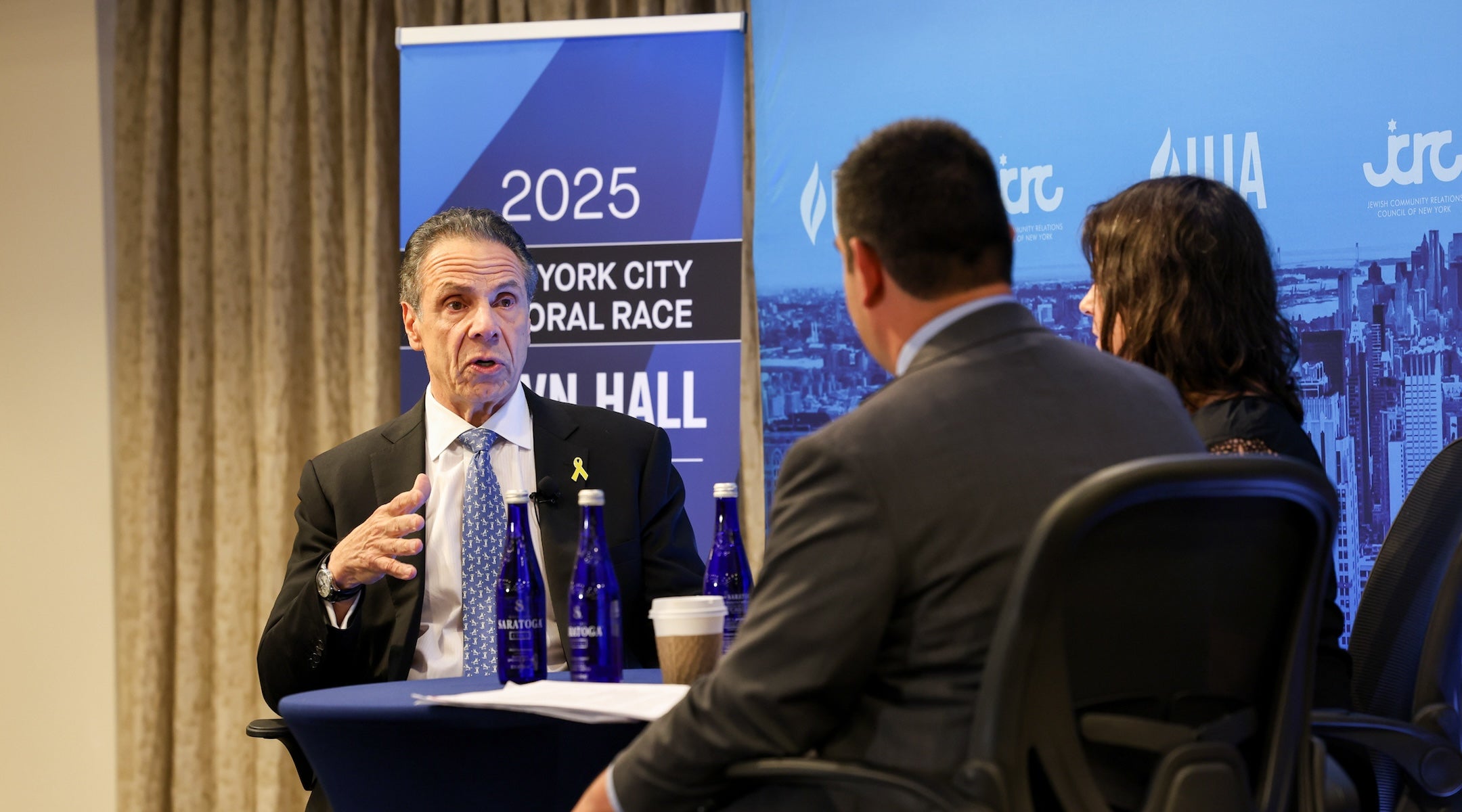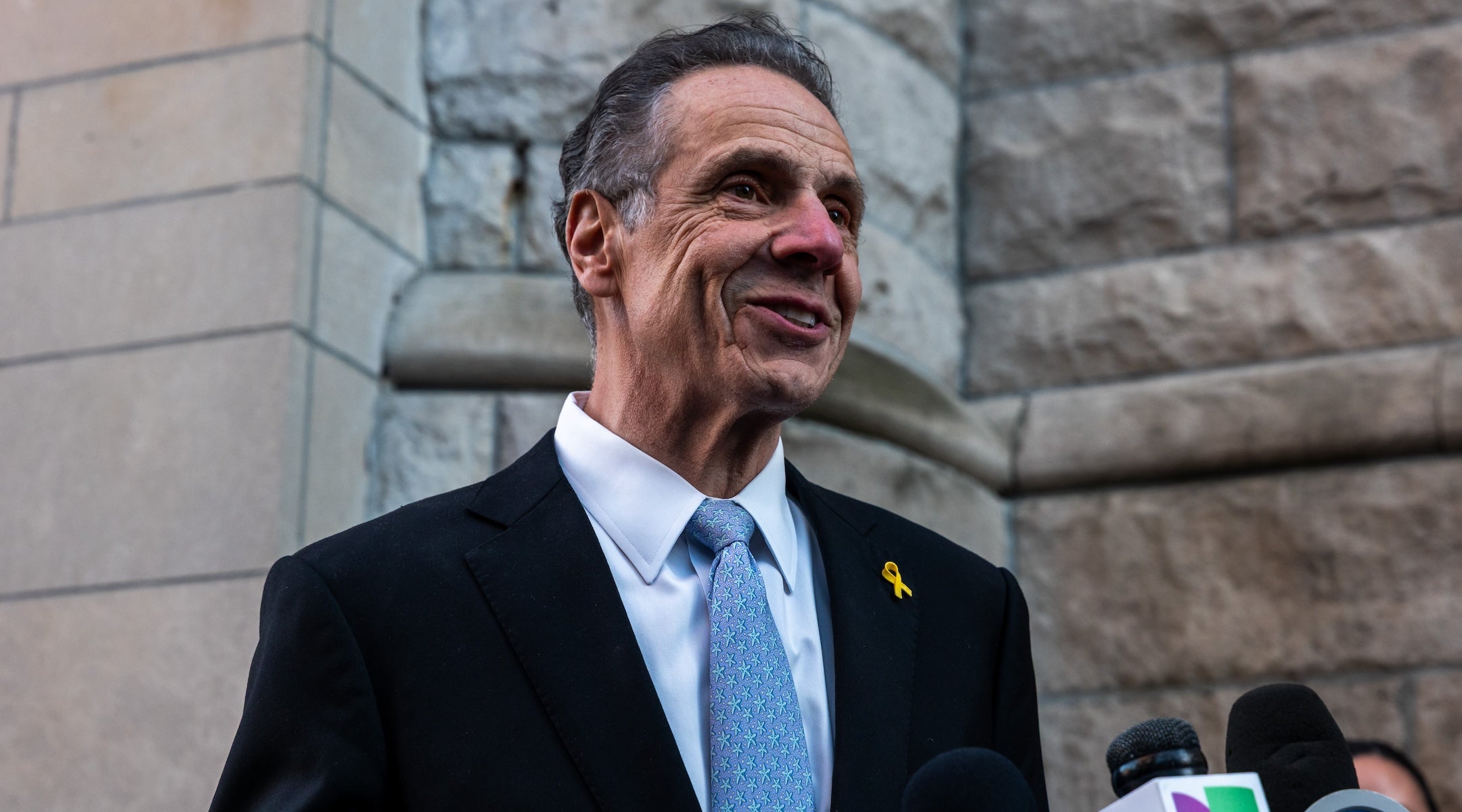Uncategorized
Andrew Cuomo said antisemitism was his ‘most important issue.’ What does his record say?

At an Upper West Side synagogue in April, Andrew Cuomo pronounced “the most important issue” in his campaign for mayor of New York City: antisemitism.
The former governor has centered an appeal to Jewish New Yorkers as he seeks to defeat the race’s frontrunner, Assemblyman Zohran Mamdani, a staunch critic of Israel. In the same speech at the West Side Institutional Synagogue, Cuomo declared a belief that has defined his attitude toward Israel and antisemitism for decades.
“It’s very simple,” he said. “Anti-Zionism is antisemitism.”
Cuomo proceeded to lose the Democratic primary to Mamdani and relaunch his campaign as an independent in the general election. Now polling second but far behind Mamdani, he contends that his vow to defend Jews lies at the heart of his bid to lead the city with the largest Jewish population in the world. He himself has two Jewish brother-in-laws and a Jewish son-in-law who joined his family last year.
Here is a breakdown of Cuomo’s history, rhetoric and policies surrounding Jews, Israel and antisemitism.

(Kena Betancur / AFP via Getty Images)
Tackling antisemitism
Cuomo has long touted deep ties to Jewish New Yorkers. In a 2002 interview with New York Jewish Week, he described being “raised in a community in Queens with Jewish people,” and he often references his Jewish in-laws.
While he was governor from 2011 to 2021, New York saw a string of attacks on Jews. In 2019 alone, those included assaults on Orthodox Jews in Brooklyn, the stabbing of five people at a rabbi’s house in Monsey, and a shooting that killed four people at a kosher supermarket just over the border in Jersey City.
Cuomo responded with several public measures. He formed a hate crimes unit in the state police, allocated $45 million to protect religious-based institutions and upped policing in Jewish neighborhoods. In 2020, he passed a law that made New York the first state to define “hate-fueled” murder as domestic terrorism, punishable by up to life in prison without parole.
During his mayoral bid, Cuomo has honed in on fighting antisemitism, often in the same breath as calling himself a stalwart supporter of Israel and a pillar against pro-Palestinian activism. He warned the crowd at the West Side Institutional Synagogue, “The forces of antisemitism and pro-Palestinian policies are organized, well funded and mobilized, and have significant political strength, even right here in the city of New York.”
At the center of Cuomo’s pitch to Jewish voters is the alternative of Mamdani, whom he has accused of “fueling antisemitism.” Mamdani says that Israel is committing genocide in Gaza and supports a boycott against Israel. Cuomo says his opponent’s positions have contributed to a breeding ground for hatred and violence against Jews, while also acknowledging that Mamdani has many younger, pro-Palestinian Jewish supporters.
A long relationship with Israel
For decades, Cuomo has emphasized his “hyper aggressive” support for Israel. He visited during the 2014 Gaza War, touring a tunnel that Israel said was built by Hamas and expressing “total solidarity” with Israel.
In 2016, he passed a controversial order that banned state agencies from investing in companies and organizations that promoted or engaged in the Boycott, Divestment and Sanctions movement against Israel. The order also required the state to create a public list of businesses aligned with BDS.
“If you boycott against Israel, New York will boycott you,” Cuomo said at the time. “If you divert revenues from Israel, New York will divert revenues from you. If you sanction Israel, New York will sanction you.”
The measure was praised by pro-Israel groups, who hold that BDS seeks to harm or destroy Israel. Critics, including the New York Civil Liberties Union, said the order infringed on First Amendment rights because boycotts are a form of free speech. Some activists also compared the public list of companies with McCarthyism. Jewish Voice for Peace, which supports BDS, protested outside Cuomo’s office.
In November 2024, Cuomo volunteered to join Israeli Prime Minister Benjamin Netanyahu’s legal defense against a warrant issued by the International Criminal Court, which charged him with war crimes and crimes against humanity in Gaza. Cuomo said at the time, “This is the moment that true friends stand up, shoulder to shoulder and fight for the State of Israel.” But by August, Cuomo said he had not been involved in defending Netanyahu since his mayoral campaign began.
During the mayoral primary, Cuomo criticized progressive candidates beyond Mamdani for their stances on Israel — including Brad Lander, the Jewish city comptroller and Netanyahu critic who cross-endorsed Mamdani. Cuomo accused Lander and City Council speaker Adrienne Adams of “aiding and supporting the most aggressive anti-Israel policies.”
Lander responded furiously at the West Side Institutional Synagogue, the same congregation where Cuomo spoke. “Somehow, we Jews have become political pawns,” said Lander. “See something or someone you don’t like? Call it antisemitism, in a cheap, craven attempt to lure in Jewish support.”

Andrew Cuomo speaks at the town hall hosted by UJA-Federation of New York and the Jewish Community Relations Council, in Midtown Manhattan, May 22, 2025. (Michael Priest Photography)
Clashing with Jews
Cuomo cultivated strong ties with Jewish leaders while he was governor, but some of those relationships hit rocky periods.
During the COVID-19 pandemic in 2020, Cuomo restricted gatherings and closed schools in Orthodox Jewish neighborhoods. He singled the community out for spreading infections “because of their religious practices” during a press conference, setting off street demonstrations among Orthodox Jews in Brooklyn.
In response to the order limiting religious gatherings, Agudath Israel of America, which represents Haredi Orthodox Jews, filed a federal lawsuit claiming their civil and religious liberties were violated. Agdath won the suit in a 5-4 ruling by the U.S. Supreme Court.
Cuomo also came under fire for allegedly disparaging an event celebrating Sukkot, when Jews gather under temporary huts often covered in tree branches, during his campaign for attorney general in 2006. He commented to his team, “These people and their f***ing tree houses,” according to The New York Times Magazine. His spokesperson denied the incident.
His friendship with Jews was also deeply tested by the sexual misconduct probe that toppled his governorship in 2021. A slew of Jewish Democrats called for his resignation, including party leaders like Sen. Chuck Schumer and Rep. Jerry Nadler. So did several liberal and progressive Jewish groups, such as the New York Jewish Agenda and Jews For Racial & Economic Justice.

Andrew Cuomo speaks outside the West Side Institutional Synagogue, April 1, 2025, New York City. (Spencer Platt/Getty Images)
The Gaza war
Cuomo’s identification as one of Israel’s fiercest defenders has been complicated by the country’s increasingly unpopular war in Gaza.
Despite maintaining in September that he is “100% pro-Israel” and “the most aggressive governor in the country on behalf of Israel,” Cuomo now supplements his condemnations of Hamas with a call to end to the war that he indirectly acknowledges has devastated Gaza. His choice of words, referencing “the carnage every night on TV” and “horrific” violence, could be interpreted as sympathetic to the deaths of more than 66,000 Palestinians — though he never directly names them.
Cuomo has also placed more distance between himself and Netanyahu, whom he once sought to represent in court. “I never stood with Bibi,” he told The New York Times in September, saying that his legal argument was about the ICC’s jurisdiction and he had no alliance with the Israeli leader.
His shift in tone could reflect declining public opinion of Israel in the United States. Across the electorate, Quinnipiac polling shows an all-time low for sympathies with Israelis and an all-time high for sympathies with Palestinians. In New York City, a Times/Siena poll found that voters preferred Mamdani’s stance on the Israeli-Palestinian conflict over any other candidate’s by a wide margin.
Still, Cuomo has not explicitly criticized Israel’s conduct. After appearing to say in August that he did not support “what the Israel government is doing vis-à-vis Gaza” and “Israel impeding humanitarian aid,” he quickly backed off. He was simply “airing what some people feel,” not giving his own personal opinion, he clarified to The New York Times.
In a recent interview with The Forward, Cuomo said his position on Israel “hasn’t shifted one iota.”
“We want three things: We want killing to stop, because it’s a matter of humanity. We want the hostages returned, and Hamas eliminated,” he said. “If you don’t eliminate Hamas, you accomplish nothing. This will happen again and again.” That, he added, was “the same thing that Israel wants.”
—
The post Andrew Cuomo said antisemitism was his ‘most important issue.’ What does his record say? appeared first on Jewish Telegraphic Agency.
Uncategorized
Tucker’s Ideas About Jews Come from Darkest Corners of the Internet, Says Huckabee After Combative Interview

US Ambassador to Israel Mike Huckabee looks on during the day he visits the Western Wall, Judaism’s holiest prayer site, in Jerusalem’s Old City, April 18, 2025. Photo: REUTERS/Ronen Zvulun
i24 News – In a combative interview with US Ambassador to Israel Mike Huckabee, right-wing firebrand Tucker Carlson made a host of contentious and often demonstrably false claims that quickly went viral online. Huckabee, who repeatedly challenged the former Fox News star during the interview, subsequently made a long post on X, identifying a pattern of bad-faith arguments, distortions and conspiracies in Carlson’s rhetorical style.
Huckabee pointed out his words were not accorded by Carlson the same degree of attention and curiosity the anchor evinced toward such unsavory characters as “the little Nazi sympathizer Nick Fuentes or the guy who thought Hitler was the good guy and Churchill the bad guy.”
“What I wasn’t anticipating was a lengthy series of questions where he seemed to be insinuating that the Jews of today aren’t really same people as the Jews of the Bible,” Huckabee wrote, adding that Tucker’s obsession with conspiracies regarding the provenance of Ashkenazi Jews obscured the fact that most Israeli Jews were refugees from the Arab and Muslim world.
The idea that Ashkenazi Jews are an Asiatic tribe who invented a false ancestry “gained traction in the 80’s and 90’s with David Duke and other Klansmen and neo-Nazis,” Huckabee wrote. “It has really caught fire in recent years on the Internet and social media, mostly from some of the most overt antisemites and Jew haters you can find.”
Carlson branded Israel “probably the most violent country on earth” and cited the false claim that Israel President Isaac Herzog had visited the infamous island of the late, disgraced sex offender Jeffrey Epstein.
“The current president of Israel, whom I know you know, apparently was at ‘pedo island.’ That’s what it says,” Carlson said, citing a debunked claim made by The Times reporter Gabrielle Weiniger. “Still-living, high-level Israeli officials are directly implicated in Epstein’s life, if not his crimes, so I think you’d be following this.”
Another misleading claim made by Carlson was that there were more Christians in Qatar than in Israel.
Uncategorized
Pezeshkian Says Iran Will Not Bow to Pressure Amid US Nuclear Talks

Iranian President Masoud Pezeshkian attends the Shanghai Cooperation Organisation (SCO) Summit 2025, in Tianjin, China, September 1, 2025. Iran’s Presidential website/WANA (West Asia News Agency)/Handout via REUTERS
Iranian President Masoud Pezeshkian said on Saturday that his country would not bow its head to pressure from world powers amid nuclear talks with the United States.
“World powers are lining up to force us to bow our heads… but we will not bow our heads despite all the problems that they are creating for us,” Pezeshkian said in a speech carried live by state TV.
Uncategorized
Italy’s RAI Apologizes after Latest Gaffe Targets Israeli Bobsleigh Team

Milano Cortina 2026 Olympics – Bobsleigh – 4-man Heat 1 – Cortina Sliding Centre, Cortina d’Ampezzo, Italy – February 21, 2026. Adam Edelman of Israel, Menachem Chen of Israel, Uri Zisman of Israel, Omer Katz of Israel in action during Heat 1. Photo: REUTERS/Athit Perawongmetha
Italy’s state broadcaster RAI was forced to apologize to the Jewish community on Saturday after an off‑air remark advising its producers to “avoid” the Israeli crew was broadcast before coverage of the Four-Man bobsleigh event at the Winter Olympics.
The head of RAI’s sports division had already resigned earlier in the week after his error-ridden commentary at the Milano Cortina 2026 opening ceremony two weeks ago triggered a revolt among its journalists.
On Saturday, viewers heard “Let’s avoid crew number 21, which is the Israeli one” and then “no, because …” before the sound was cut off.
RAI CEO Giampaolo Rossi said the incident represented a “serious” breach of the principles of impartiality, respect and inclusion that should guide the public broadcaster.
He added that RAI had opened an internal inquiry to swiftly determine any responsibility and any potential disciplinary procedures.
In a separate statement RAI’s board of directors condemned the remark as “unacceptable.”
The board apologized to the Jewish community, the athletes involved and all viewers who felt offended.
RAI is the country’s largest media organization and operates national television, radio and digital news services.
The union representing RAI journalists, Usigrai, had said Paolo Petrecca’s opening ceremony commentary had dealt “a serious blow” to the company’s credibility.
His missteps included misidentifying venues and public figures, and making comments about national teams that were widely criticized.


